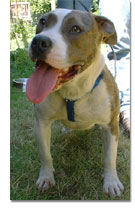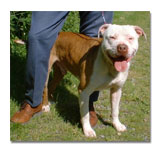 |
|
|
 |
 |
 |
Breed Profile
--Written By Susan Thompson

 Breed: Breed:
American Pit Bull Terrier/ American Staffordshire Terrier
Average Life Span:
12-14 years
Typical Health Problems:
Generally healthy, may be subject to Parvo, hip displaysia, hereditary cataracts and allergies.
Personality:
Pit bulls tend to be very dependent on their humans and crave love and attention.
On average, pit bulls tend to be very confident and outgoing dogs. However, their natural confidence can be eroded by severe abuse or long confinement with little human contact.
What are these dogs surrendered for typically?
Owner turn-ins of pit bulls are usually due to dog aggression (which is often mistaken for human aggression by inexperienced owners).
Other reasons include:- Destructive chewing, which is usually out of frustration and lack of exercise
- Too much energy/lack of time for dog and breed specific legislation against pit bulls in the area/moving to an area with breed specific legislation.
- Pit bulls also often are brought in as strays or confiscated from abusive owners, dog fighters, or criminals.
 How do these dogs handle rescue or shelter life? How do these dogs handle rescue or shelter life?
Being an extremely people-oriented breed as well as one that tends to be dog aggressive, the typical pit bull is not happy in a kennel setting. This breed does, however, do well in a home fostering situation, as they tend to bond quickly with new people. How well they tolerate a rescue or shelter depends heavily on the amount of human attention, contact, and exercise they receive, as well as on the individual dog's temperament and past experiences.
What would be the ideal owner for this breed?
The ideal owner of a pit bull is an extremely responsible person committed to the care, training and exercise of their dog. Such an owner should be knowledgeable about the breed (or at least willing to learn), very aware of the dog aggressive but people loving nature of the breed, and dedicated to protecting not only their dog, but also the breed as a whole from the continuing media hysteria generated by bad press and bad owners. The ideal owner of a pit bull would never allow their dog to roam the neighborhood, be off leash in a public place or around strange dogs, and would not leave their adult pit bull alone and unsupervised with another dog of any breed, since fights can start between unsupervised dogs, especially dogs of the same sex, and such fights can have serious consequences. This owner would spay/neuter, make sure their dog remains socialized with all types of people, contain their dog securely when not supervised by an adult, obedience train their dog, and insure that their dog is well exercised every day. This owner would NOT be looking for a guard dog, as pit bulls are typically very people friendly and not naturally inclined toward "man work." This owner would either have no other dogs or an altered dog of opposite sex, since many pit bulls are same sex aggressive and can be placed with a non-dominant dog of opposite sex.
Is this breed good with children in general?
This breed tends to love all people, especially children. The only caution I would add is that, because they are very exuberant and energetic dogs, they can sometimes overwhelm very young children and accidentally bump them or knock them over, particularly when they are pups (under 2 years old).
Is this breed good with other dogs in general?
The short answer is no. Developed for the purpose of fighting other dogs, most pit bulls are dog aggressive, at least to some degree. Some pit bulls will simply not tolerate any other dogs, regardless of sex. A few pit bulls will remain dog friendly their entire lives, but they are a minority. The majority of pit bulls are at least same sex aggressive and as adults will not do well with other dogs of the same sex or those that are "pushy" with them, although as pups they may get along fine (this can be very misleading to a novice pit bull owner). Pit bulls will commonly start developing signs of dog aggression between the ages of 8 months and 2 years, although it can develop at any age and can come on either gradually or quite suddenly. It is important to note that many pit bulls do not display the "typical" signs of dog aggression before a fight. They may not growl, bark, or posture at all, but simply alert and raise up on their toes. Owners of dog aggressive pit bulls learn to "read" their dogs and recognize the subtle signs indicating impending dog aggression. Training will not eliminate dog aggression in the pit bull but, when combined with responsibility and vigilance, training can bring these natural tendencies under control in on-leash situations. Where housemates are concerned, if one is a pit bull, extra care should be taken to prevent tension over food, desirable treats (like bones), and favored toys. These items are often "triggers" for spats or fights between dogs sharing the same house and owners should be very aware of them. This is also the reason that an adult pit bull should NOT be left alone with housemates or other dogs. Due to their fighting heritage, many pit bulls do not recognize signs of submission given by a dog they are fighting and, if they are unsupervised, the results can be disastrous. It should be noted that many breeds have dog aggressive tendencies, and leaving any such breed unsupervised with another dog, especially a dog of the same sex, can lead to a tragedy. The majority of pit bulls are at least same sex aggressive and as adults will not do well with other dogs of the same sex or those that are "pushy" with them, although as pups they may get along fine (this can be very misleading to a novice pit bull owner). Pit bulls will commonly start developing signs of dog aggression between the ages of 8 months and 2 years, although it can develop at any age and can come on either gradually or quite suddenly. It is important to note that many pit bulls do not display the "typical" signs of dog aggression before a fight. They may not growl, bark, or posture at all, but simply alert and raise up on their toes. Owners of dog aggressive pit bulls learn to "read" their dogs and recognize the subtle signs indicating impending dog aggression. Training will not eliminate dog aggression in the pit bull but, when combined with responsibility and vigilance, training can bring these natural tendencies under control in on-leash situations. Where housemates are concerned, if one is a pit bull, extra care should be taken to prevent tension over food, desirable treats (like bones), and favored toys. These items are often "triggers" for spats or fights between dogs sharing the same house and owners should be very aware of them. This is also the reason that an adult pit bull should NOT be left alone with housemates or other dogs. Due to their fighting heritage, many pit bulls do not recognize signs of submission given by a dog they are fighting and, if they are unsupervised, the results can be disastrous. It should be noted that many breeds have dog aggressive tendencies, and leaving any such breed unsupervised with another dog, especially a dog of the same sex, can lead to a tragedy.
 How easy is housetraining with this breed? How easy is housetraining with this breed?
There is much variation to the time housetraining will take, depending on the method used. Pit bulls, as a group, are intelligent dogs, soft to their owners and relatively easy to train as they are eager to please their owners. With all phases of training, praise is a key element when it comes to the pit bull. Positive methods will work best for training this breed.
How easy is socialization with this breed?
With humans, the pit bull is very easy to socialize but, since they tend to be very enthusiastic, they should be taught manners early on. A trained pit bull is often a "social butterfly," loving friends and strangers alike. As with most breeds, socialization with humans of all types should be part of the dog's training for life. Note: A pit bull that shows unprovoked human aggression, especially with children, is NOT typical of the breed and is showing very poor temperament. Such a dog should be thoroughly evaluated by a trainer or behaviorist experienced in the breed for a final determination of their temperament and recommendation on how to proceed.
Other relevant information:
The pit bull is typically a people loving, intelligent and fun breed. Many excel at obedience training and dog sports such as agility, weight pull, frisbee, and flyball. Due to their affinity with people, this breed is a good candidate for rescue and adoption, but potential homes need to be carefully screened to insure that the new owners understand and accept the responsibility of owning a pit bull. Media hysteria and bad owners have greatly damaged this breed and every incident involving a pit bull makes it worse for the entire breed and their owners, often prompting breed specific legislation or breed bans.
Potential owners need to be informed of the pit bull's correct temperament, and need to be prepared to deal with the issue of dog aggression. Most pit bulls have a high prey drive and may chase small animals or livestock. This is NOT a breed for everyone! The only way to repair the pit bull's bad reputation is to keep them in the hands of responsible owners. |
|

